Finance Report: CBA Class Action and Money Laundering
VerifiedAdded on 2020/05/28
|9
|1636
|31
Report
AI Summary
This finance report examines the Commonwealth Bank of Australia (CBA) class action, initiated due to alleged breaches of anti-money laundering and terrorism finance laws. The report details the accusations against CBA, including its failure to report cash transactions over $10,000 to AUSTRAC, leading to significant drops in share prices and shareholder losses. It explores the concepts of corporate governance, emphasizing the responsibilities of the Board of Directors and senior management in ensuring compliance with financial regulations. The report also delves into the process of money laundering, its negative impacts on a country's financial system, and alternative channels used to launder money. The analysis highlights the failures of CBA's management in preventing money laundering and the consequences of such failures on the bank and its stakeholders, including shareholders, government, and society.
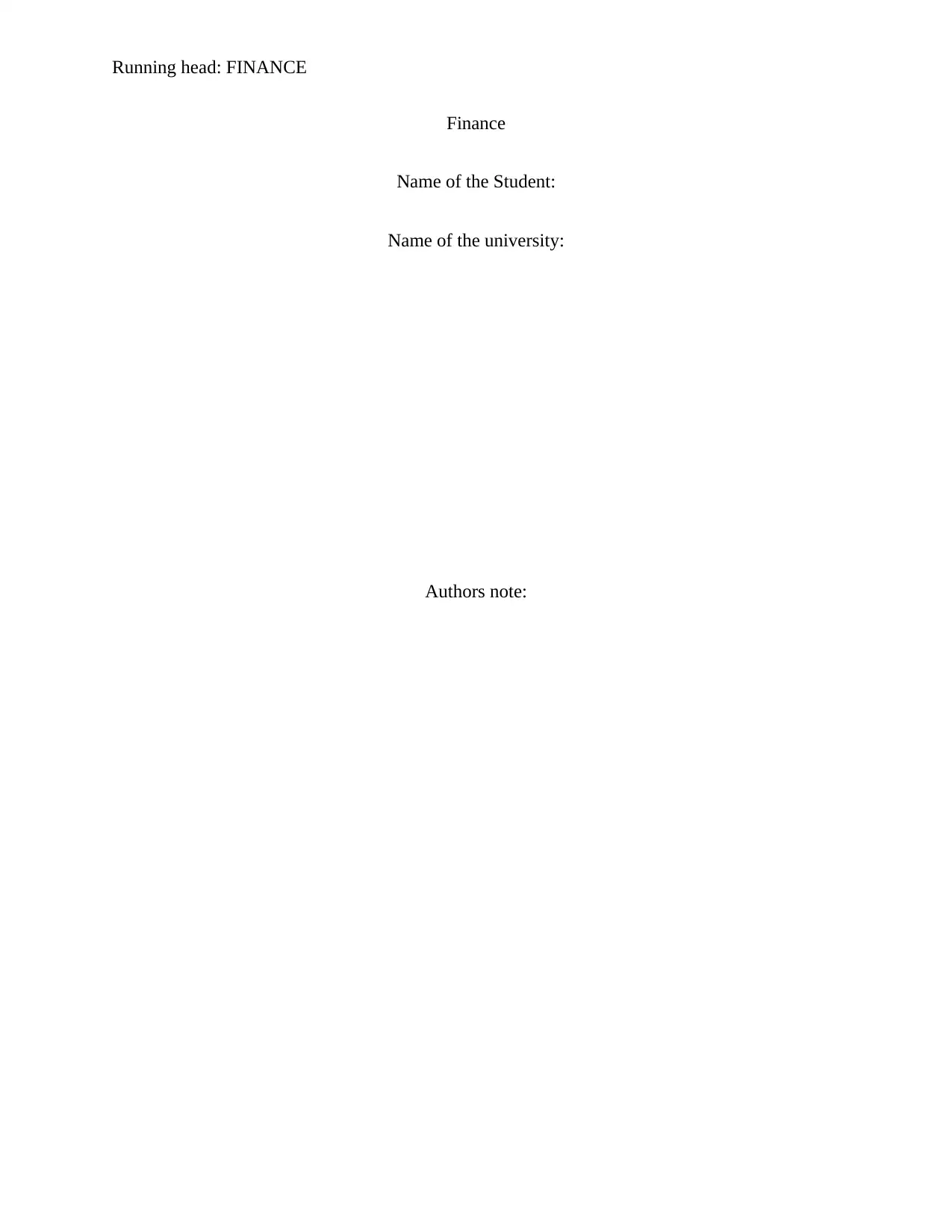
Running head: FINANCE
Finance
Name of the Student:
Name of the university:
Authors note:
Finance
Name of the Student:
Name of the university:
Authors note:
Paraphrase This Document
Need a fresh take? Get an instant paraphrase of this document with our AI Paraphraser
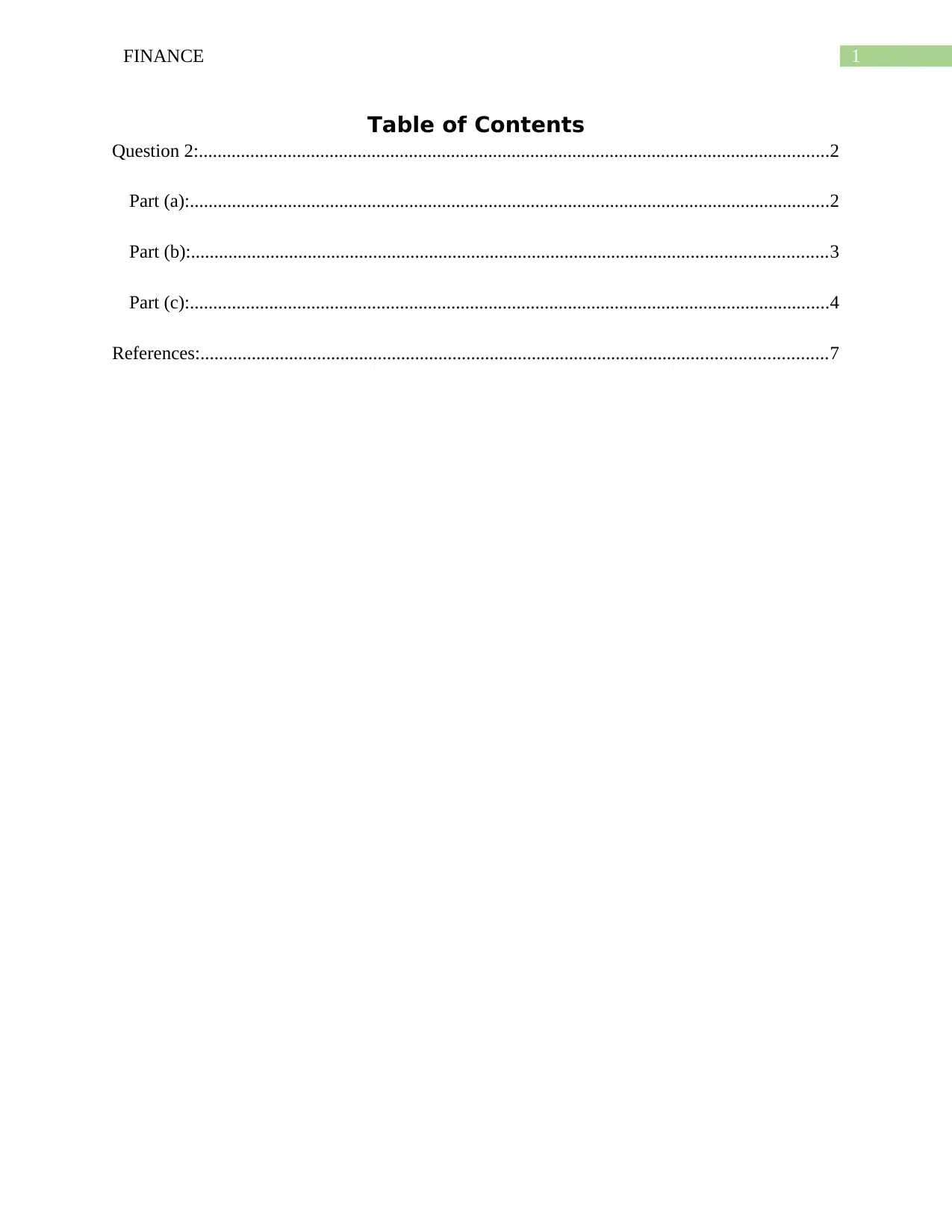
1FINANCE
Table of Contents
Question 2:.......................................................................................................................................2
Part (a):.........................................................................................................................................2
Part (b):........................................................................................................................................3
Part (c):.........................................................................................................................................4
References:......................................................................................................................................7
Table of Contents
Question 2:.......................................................................................................................................2
Part (a):.........................................................................................................................................2
Part (b):........................................................................................................................................3
Part (c):.........................................................................................................................................4
References:......................................................................................................................................7
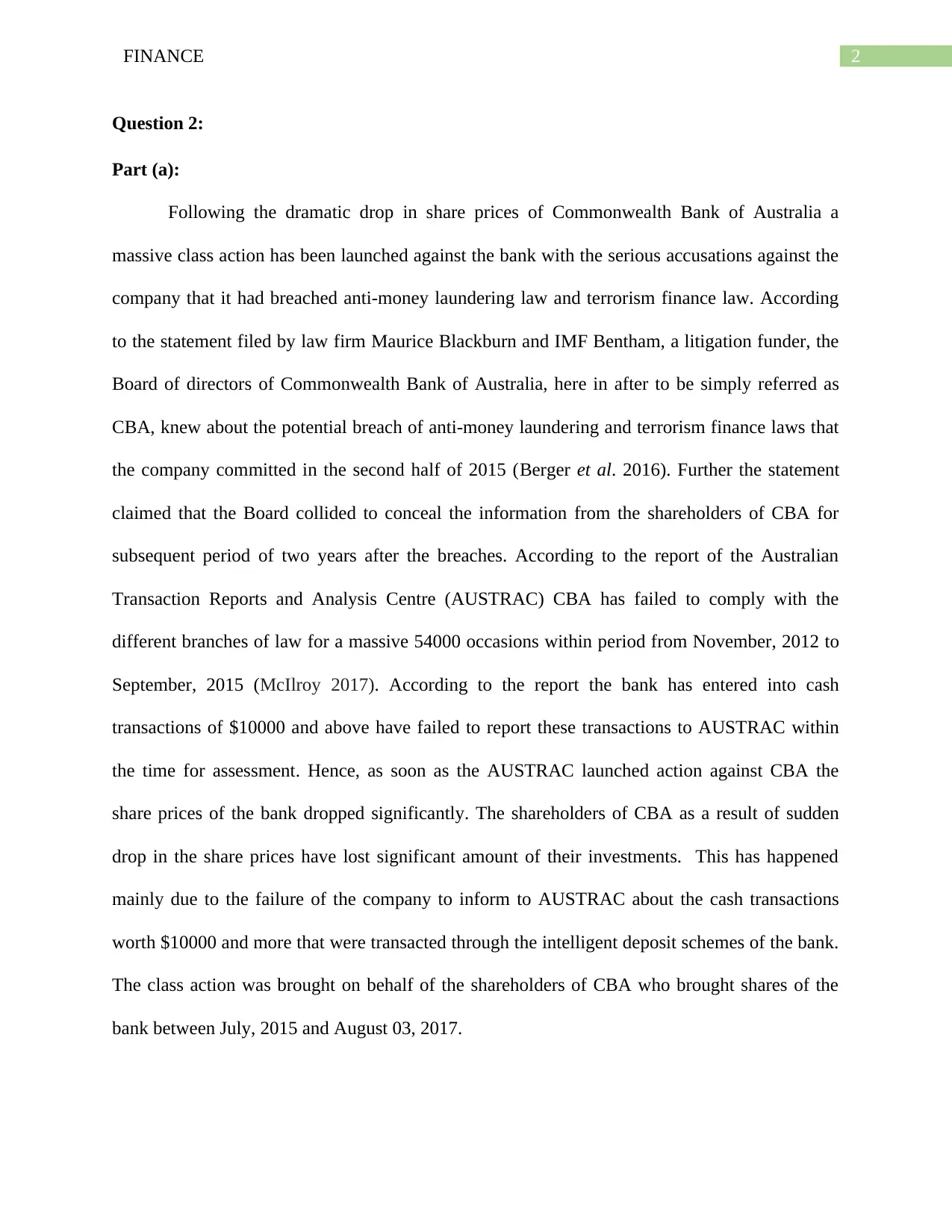
2FINANCE
Question 2:
Part (a):
Following the dramatic drop in share prices of Commonwealth Bank of Australia a
massive class action has been launched against the bank with the serious accusations against the
company that it had breached anti-money laundering law and terrorism finance law. According
to the statement filed by law firm Maurice Blackburn and IMF Bentham, a litigation funder, the
Board of directors of Commonwealth Bank of Australia, here in after to be simply referred as
CBA, knew about the potential breach of anti-money laundering and terrorism finance laws that
the company committed in the second half of 2015 (Berger et al. 2016). Further the statement
claimed that the Board collided to conceal the information from the shareholders of CBA for
subsequent period of two years after the breaches. According to the report of the Australian
Transaction Reports and Analysis Centre (AUSTRAC) CBA has failed to comply with the
different branches of law for a massive 54000 occasions within period from November, 2012 to
September, 2015 (McIlroy 2017). According to the report the bank has entered into cash
transactions of $10000 and above have failed to report these transactions to AUSTRAC within
the time for assessment. Hence, as soon as the AUSTRAC launched action against CBA the
share prices of the bank dropped significantly. The shareholders of CBA as a result of sudden
drop in the share prices have lost significant amount of their investments. This has happened
mainly due to the failure of the company to inform to AUSTRAC about the cash transactions
worth $10000 and more that were transacted through the intelligent deposit schemes of the bank.
The class action was brought on behalf of the shareholders of CBA who brought shares of the
bank between July, 2015 and August 03, 2017.
Question 2:
Part (a):
Following the dramatic drop in share prices of Commonwealth Bank of Australia a
massive class action has been launched against the bank with the serious accusations against the
company that it had breached anti-money laundering law and terrorism finance law. According
to the statement filed by law firm Maurice Blackburn and IMF Bentham, a litigation funder, the
Board of directors of Commonwealth Bank of Australia, here in after to be simply referred as
CBA, knew about the potential breach of anti-money laundering and terrorism finance laws that
the company committed in the second half of 2015 (Berger et al. 2016). Further the statement
claimed that the Board collided to conceal the information from the shareholders of CBA for
subsequent period of two years after the breaches. According to the report of the Australian
Transaction Reports and Analysis Centre (AUSTRAC) CBA has failed to comply with the
different branches of law for a massive 54000 occasions within period from November, 2012 to
September, 2015 (McIlroy 2017). According to the report the bank has entered into cash
transactions of $10000 and above have failed to report these transactions to AUSTRAC within
the time for assessment. Hence, as soon as the AUSTRAC launched action against CBA the
share prices of the bank dropped significantly. The shareholders of CBA as a result of sudden
drop in the share prices have lost significant amount of their investments. This has happened
mainly due to the failure of the company to inform to AUSTRAC about the cash transactions
worth $10000 and more that were transacted through the intelligent deposit schemes of the bank.
The class action was brought on behalf of the shareholders of CBA who brought shares of the
bank between July, 2015 and August 03, 2017.
⊘ This is a preview!⊘
Do you want full access?
Subscribe today to unlock all pages.

Trusted by 1+ million students worldwide
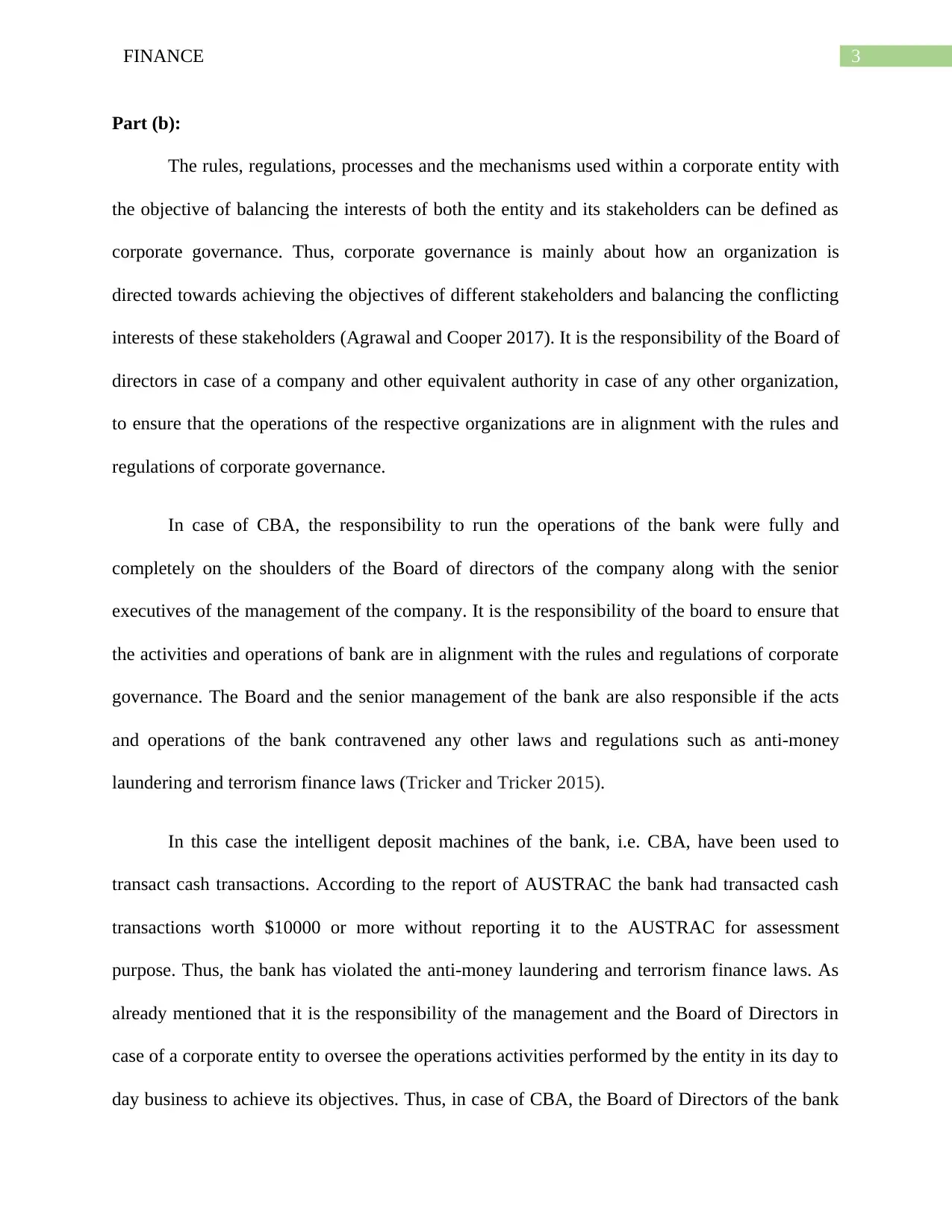
3FINANCE
Part (b):
The rules, regulations, processes and the mechanisms used within a corporate entity with
the objective of balancing the interests of both the entity and its stakeholders can be defined as
corporate governance. Thus, corporate governance is mainly about how an organization is
directed towards achieving the objectives of different stakeholders and balancing the conflicting
interests of these stakeholders (Agrawal and Cooper 2017). It is the responsibility of the Board of
directors in case of a company and other equivalent authority in case of any other organization,
to ensure that the operations of the respective organizations are in alignment with the rules and
regulations of corporate governance.
In case of CBA, the responsibility to run the operations of the bank were fully and
completely on the shoulders of the Board of directors of the company along with the senior
executives of the management of the company. It is the responsibility of the board to ensure that
the activities and operations of bank are in alignment with the rules and regulations of corporate
governance. The Board and the senior management of the bank are also responsible if the acts
and operations of the bank contravened any other laws and regulations such as anti-money
laundering and terrorism finance laws (Tricker and Tricker 2015).
In this case the intelligent deposit machines of the bank, i.e. CBA, have been used to
transact cash transactions. According to the report of AUSTRAC the bank had transacted cash
transactions worth $10000 or more without reporting it to the AUSTRAC for assessment
purpose. Thus, the bank has violated the anti-money laundering and terrorism finance laws. As
already mentioned that it is the responsibility of the management and the Board of Directors in
case of a corporate entity to oversee the operations activities performed by the entity in its day to
day business to achieve its objectives. Thus, in case of CBA, the Board of Directors of the bank
Part (b):
The rules, regulations, processes and the mechanisms used within a corporate entity with
the objective of balancing the interests of both the entity and its stakeholders can be defined as
corporate governance. Thus, corporate governance is mainly about how an organization is
directed towards achieving the objectives of different stakeholders and balancing the conflicting
interests of these stakeholders (Agrawal and Cooper 2017). It is the responsibility of the Board of
directors in case of a company and other equivalent authority in case of any other organization,
to ensure that the operations of the respective organizations are in alignment with the rules and
regulations of corporate governance.
In case of CBA, the responsibility to run the operations of the bank were fully and
completely on the shoulders of the Board of directors of the company along with the senior
executives of the management of the company. It is the responsibility of the board to ensure that
the activities and operations of bank are in alignment with the rules and regulations of corporate
governance. The Board and the senior management of the bank are also responsible if the acts
and operations of the bank contravened any other laws and regulations such as anti-money
laundering and terrorism finance laws (Tricker and Tricker 2015).
In this case the intelligent deposit machines of the bank, i.e. CBA, have been used to
transact cash transactions. According to the report of AUSTRAC the bank had transacted cash
transactions worth $10000 or more without reporting it to the AUSTRAC for assessment
purpose. Thus, the bank has violated the anti-money laundering and terrorism finance laws. As
already mentioned that it is the responsibility of the management and the Board of Directors in
case of a corporate entity to oversee the operations activities performed by the entity in its day to
day business to achieve its objectives. Thus, in case of CBA, the Board of Directors of the bank
Paraphrase This Document
Need a fresh take? Get an instant paraphrase of this document with our AI Paraphraser
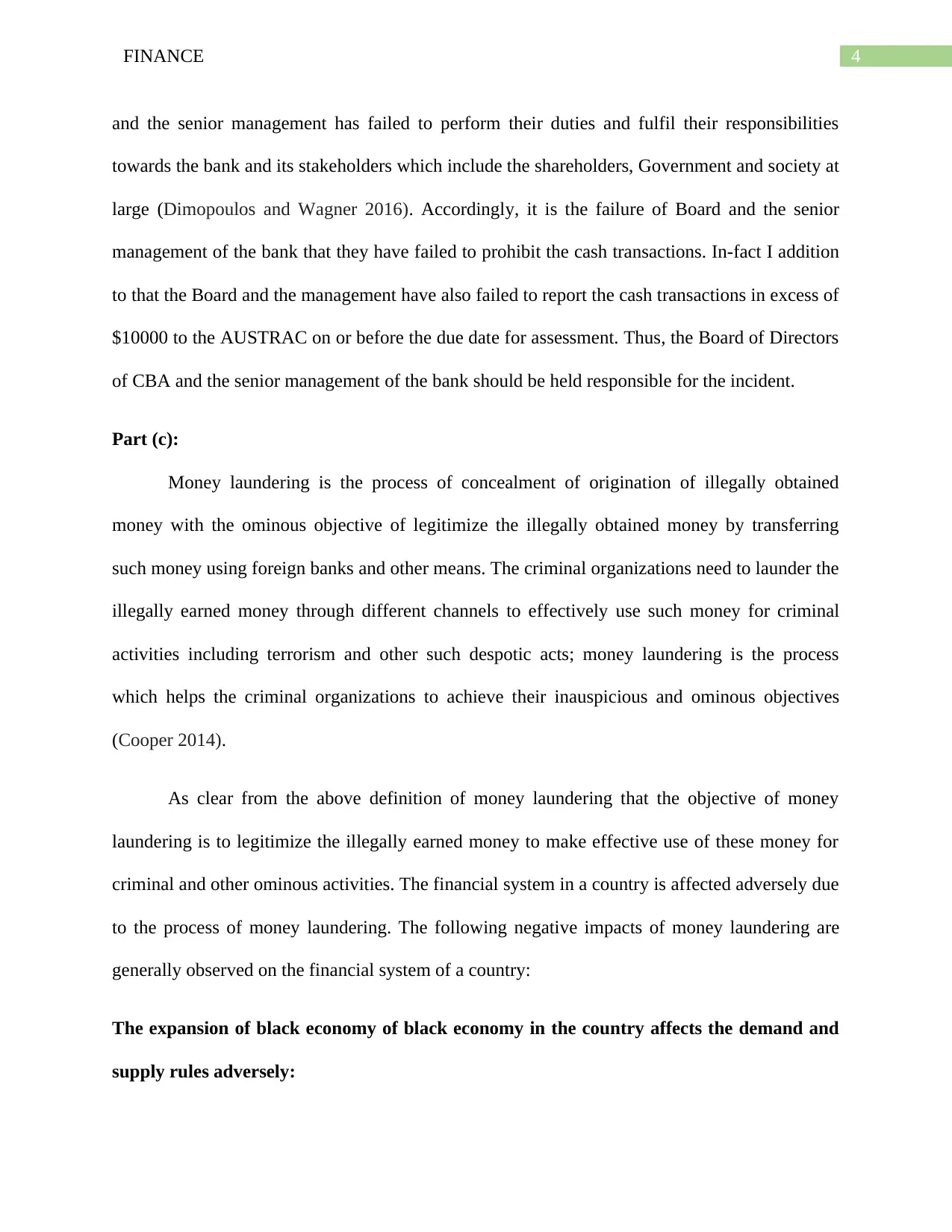
4FINANCE
and the senior management has failed to perform their duties and fulfil their responsibilities
towards the bank and its stakeholders which include the shareholders, Government and society at
large (Dimopoulos and Wagner 2016). Accordingly, it is the failure of Board and the senior
management of the bank that they have failed to prohibit the cash transactions. In-fact I addition
to that the Board and the management have also failed to report the cash transactions in excess of
$10000 to the AUSTRAC on or before the due date for assessment. Thus, the Board of Directors
of CBA and the senior management of the bank should be held responsible for the incident.
Part (c):
Money laundering is the process of concealment of origination of illegally obtained
money with the ominous objective of legitimize the illegally obtained money by transferring
such money using foreign banks and other means. The criminal organizations need to launder the
illegally earned money through different channels to effectively use such money for criminal
activities including terrorism and other such despotic acts; money laundering is the process
which helps the criminal organizations to achieve their inauspicious and ominous objectives
(Cooper 2014).
As clear from the above definition of money laundering that the objective of money
laundering is to legitimize the illegally earned money to make effective use of these money for
criminal and other ominous activities. The financial system in a country is affected adversely due
to the process of money laundering. The following negative impacts of money laundering are
generally observed on the financial system of a country:
The expansion of black economy of black economy in the country affects the demand and
supply rules adversely:
and the senior management has failed to perform their duties and fulfil their responsibilities
towards the bank and its stakeholders which include the shareholders, Government and society at
large (Dimopoulos and Wagner 2016). Accordingly, it is the failure of Board and the senior
management of the bank that they have failed to prohibit the cash transactions. In-fact I addition
to that the Board and the management have also failed to report the cash transactions in excess of
$10000 to the AUSTRAC on or before the due date for assessment. Thus, the Board of Directors
of CBA and the senior management of the bank should be held responsible for the incident.
Part (c):
Money laundering is the process of concealment of origination of illegally obtained
money with the ominous objective of legitimize the illegally obtained money by transferring
such money using foreign banks and other means. The criminal organizations need to launder the
illegally earned money through different channels to effectively use such money for criminal
activities including terrorism and other such despotic acts; money laundering is the process
which helps the criminal organizations to achieve their inauspicious and ominous objectives
(Cooper 2014).
As clear from the above definition of money laundering that the objective of money
laundering is to legitimize the illegally earned money to make effective use of these money for
criminal and other ominous activities. The financial system in a country is affected adversely due
to the process of money laundering. The following negative impacts of money laundering are
generally observed on the financial system of a country:
The expansion of black economy of black economy in the country affects the demand and
supply rules adversely:
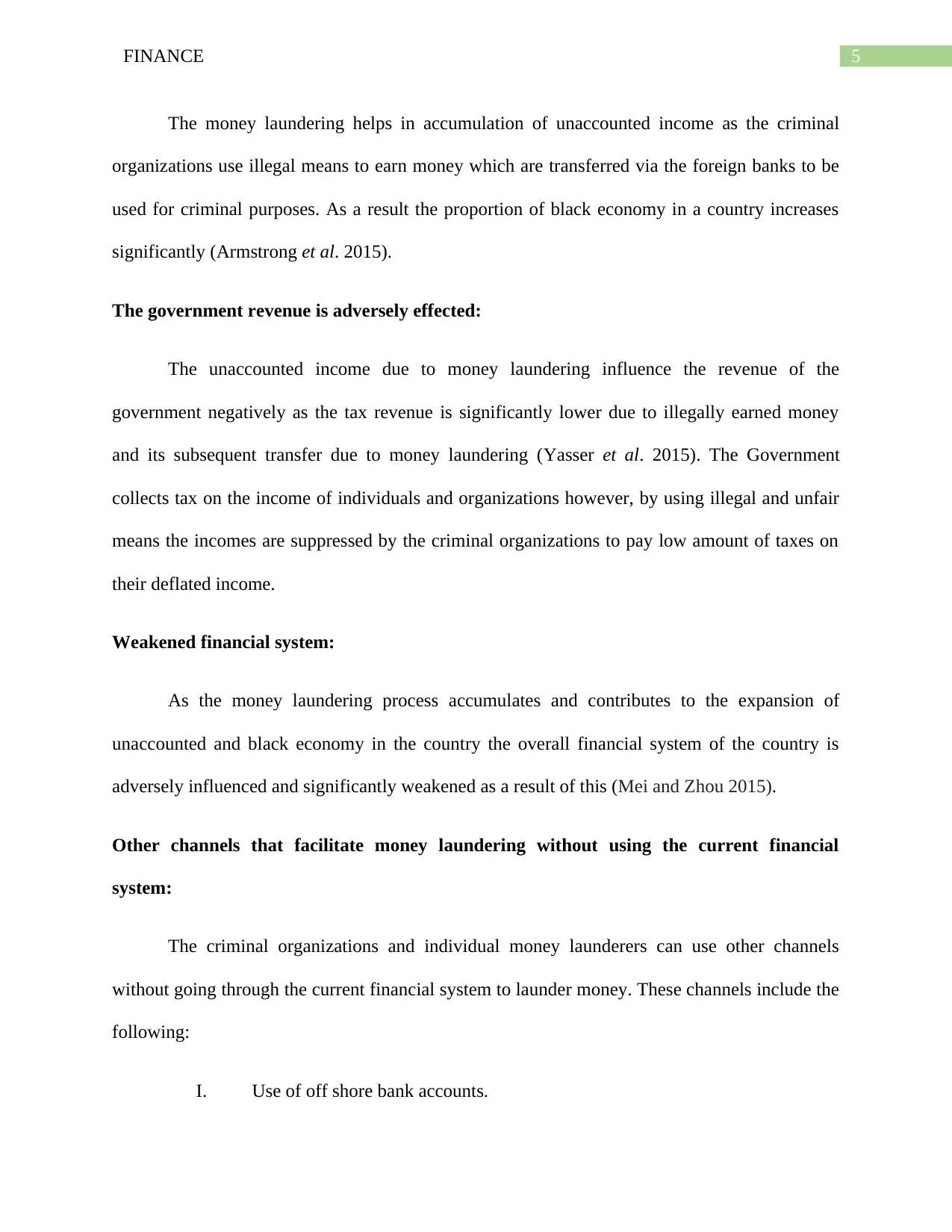
5FINANCE
The money laundering helps in accumulation of unaccounted income as the criminal
organizations use illegal means to earn money which are transferred via the foreign banks to be
used for criminal purposes. As a result the proportion of black economy in a country increases
significantly (Armstrong et al. 2015).
The government revenue is adversely effected:
The unaccounted income due to money laundering influence the revenue of the
government negatively as the tax revenue is significantly lower due to illegally earned money
and its subsequent transfer due to money laundering (Yasser et al. 2015). The Government
collects tax on the income of individuals and organizations however, by using illegal and unfair
means the incomes are suppressed by the criminal organizations to pay low amount of taxes on
their deflated income.
Weakened financial system:
As the money laundering process accumulates and contributes to the expansion of
unaccounted and black economy in the country the overall financial system of the country is
adversely influenced and significantly weakened as a result of this (Mei and Zhou 2015).
Other channels that facilitate money laundering without using the current financial
system:
The criminal organizations and individual money launderers can use other channels
without going through the current financial system to launder money. These channels include the
following:
I. Use of off shore bank accounts.
The money laundering helps in accumulation of unaccounted income as the criminal
organizations use illegal means to earn money which are transferred via the foreign banks to be
used for criminal purposes. As a result the proportion of black economy in a country increases
significantly (Armstrong et al. 2015).
The government revenue is adversely effected:
The unaccounted income due to money laundering influence the revenue of the
government negatively as the tax revenue is significantly lower due to illegally earned money
and its subsequent transfer due to money laundering (Yasser et al. 2015). The Government
collects tax on the income of individuals and organizations however, by using illegal and unfair
means the incomes are suppressed by the criminal organizations to pay low amount of taxes on
their deflated income.
Weakened financial system:
As the money laundering process accumulates and contributes to the expansion of
unaccounted and black economy in the country the overall financial system of the country is
adversely influenced and significantly weakened as a result of this (Mei and Zhou 2015).
Other channels that facilitate money laundering without using the current financial
system:
The criminal organizations and individual money launderers can use other channels
without going through the current financial system to launder money. These channels include the
following:
I. Use of off shore bank accounts.
⊘ This is a preview!⊘
Do you want full access?
Subscribe today to unlock all pages.

Trusted by 1+ million students worldwide
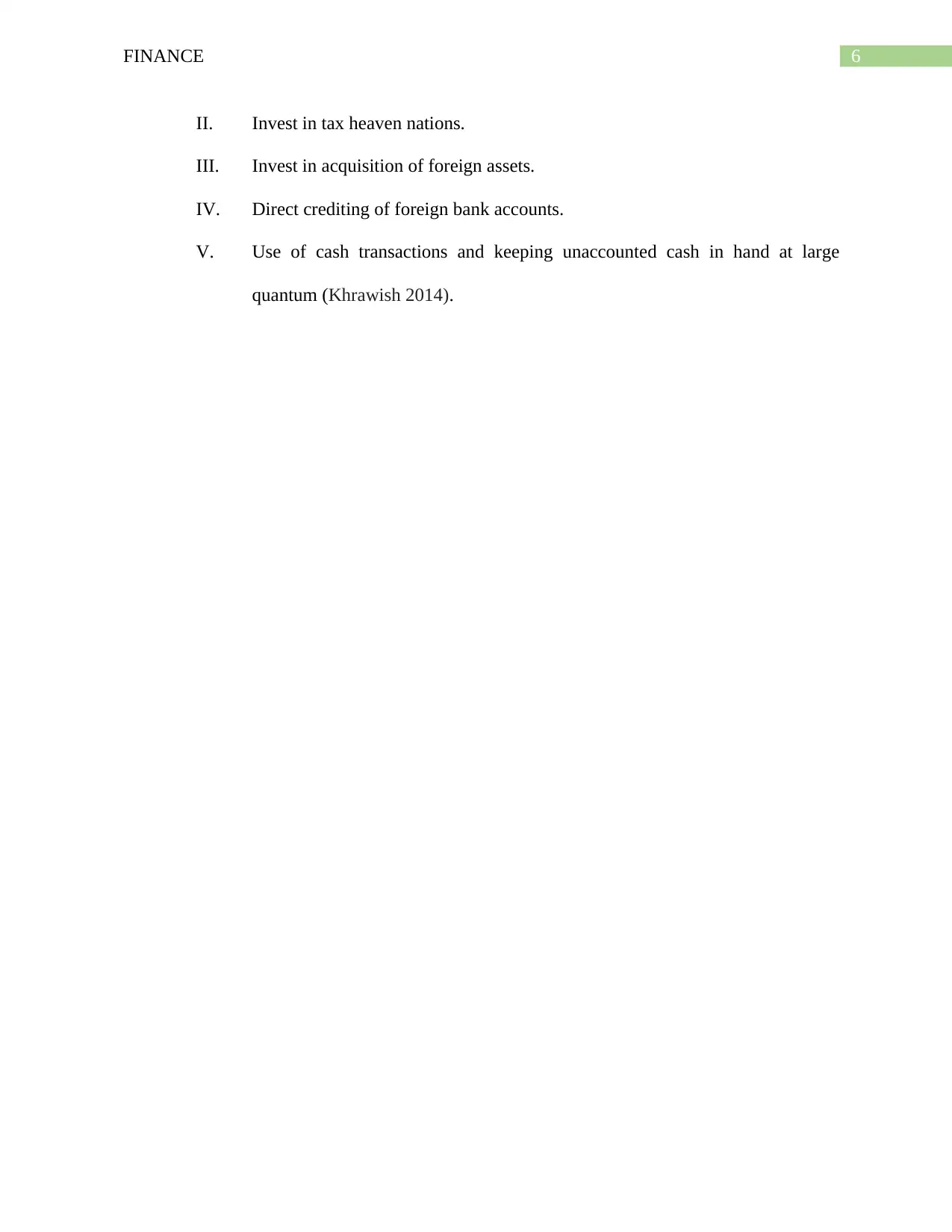
6FINANCE
II. Invest in tax heaven nations.
III. Invest in acquisition of foreign assets.
IV. Direct crediting of foreign bank accounts.
V. Use of cash transactions and keeping unaccounted cash in hand at large
quantum (Khrawish 2014).
II. Invest in tax heaven nations.
III. Invest in acquisition of foreign assets.
IV. Direct crediting of foreign bank accounts.
V. Use of cash transactions and keeping unaccounted cash in hand at large
quantum (Khrawish 2014).
Paraphrase This Document
Need a fresh take? Get an instant paraphrase of this document with our AI Paraphraser
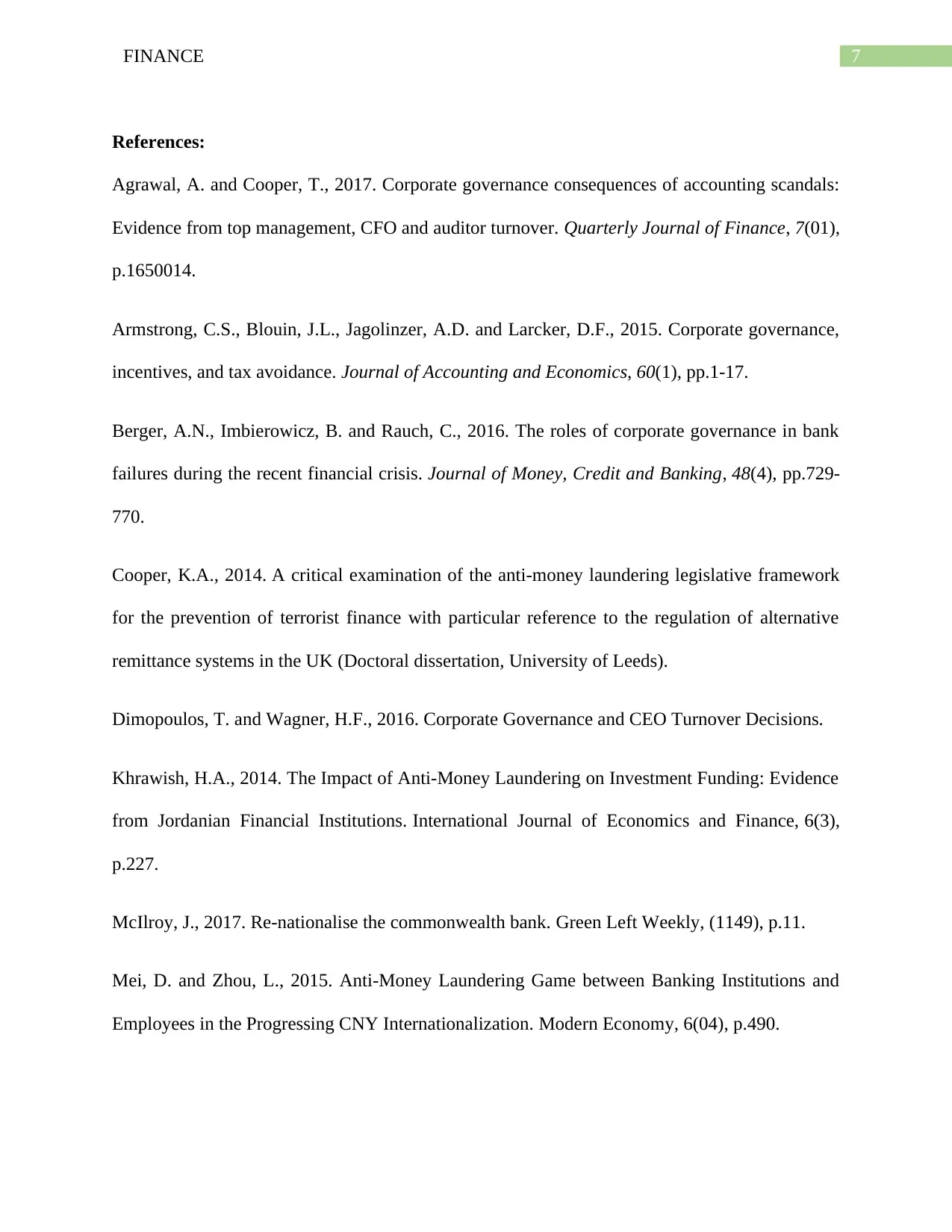
7FINANCE
References:
Agrawal, A. and Cooper, T., 2017. Corporate governance consequences of accounting scandals:
Evidence from top management, CFO and auditor turnover. Quarterly Journal of Finance, 7(01),
p.1650014.
Armstrong, C.S., Blouin, J.L., Jagolinzer, A.D. and Larcker, D.F., 2015. Corporate governance,
incentives, and tax avoidance. Journal of Accounting and Economics, 60(1), pp.1-17.
Berger, A.N., Imbierowicz, B. and Rauch, C., 2016. The roles of corporate governance in bank
failures during the recent financial crisis. Journal of Money, Credit and Banking, 48(4), pp.729-
770.
Cooper, K.A., 2014. A critical examination of the anti-money laundering legislative framework
for the prevention of terrorist finance with particular reference to the regulation of alternative
remittance systems in the UK (Doctoral dissertation, University of Leeds).
Dimopoulos, T. and Wagner, H.F., 2016. Corporate Governance and CEO Turnover Decisions.
Khrawish, H.A., 2014. The Impact of Anti-Money Laundering on Investment Funding: Evidence
from Jordanian Financial Institutions. International Journal of Economics and Finance, 6(3),
p.227.
McIlroy, J., 2017. Re-nationalise the commonwealth bank. Green Left Weekly, (1149), p.11.
Mei, D. and Zhou, L., 2015. Anti-Money Laundering Game between Banking Institutions and
Employees in the Progressing CNY Internationalization. Modern Economy, 6(04), p.490.
References:
Agrawal, A. and Cooper, T., 2017. Corporate governance consequences of accounting scandals:
Evidence from top management, CFO and auditor turnover. Quarterly Journal of Finance, 7(01),
p.1650014.
Armstrong, C.S., Blouin, J.L., Jagolinzer, A.D. and Larcker, D.F., 2015. Corporate governance,
incentives, and tax avoidance. Journal of Accounting and Economics, 60(1), pp.1-17.
Berger, A.N., Imbierowicz, B. and Rauch, C., 2016. The roles of corporate governance in bank
failures during the recent financial crisis. Journal of Money, Credit and Banking, 48(4), pp.729-
770.
Cooper, K.A., 2014. A critical examination of the anti-money laundering legislative framework
for the prevention of terrorist finance with particular reference to the regulation of alternative
remittance systems in the UK (Doctoral dissertation, University of Leeds).
Dimopoulos, T. and Wagner, H.F., 2016. Corporate Governance and CEO Turnover Decisions.
Khrawish, H.A., 2014. The Impact of Anti-Money Laundering on Investment Funding: Evidence
from Jordanian Financial Institutions. International Journal of Economics and Finance, 6(3),
p.227.
McIlroy, J., 2017. Re-nationalise the commonwealth bank. Green Left Weekly, (1149), p.11.
Mei, D. and Zhou, L., 2015. Anti-Money Laundering Game between Banking Institutions and
Employees in the Progressing CNY Internationalization. Modern Economy, 6(04), p.490.
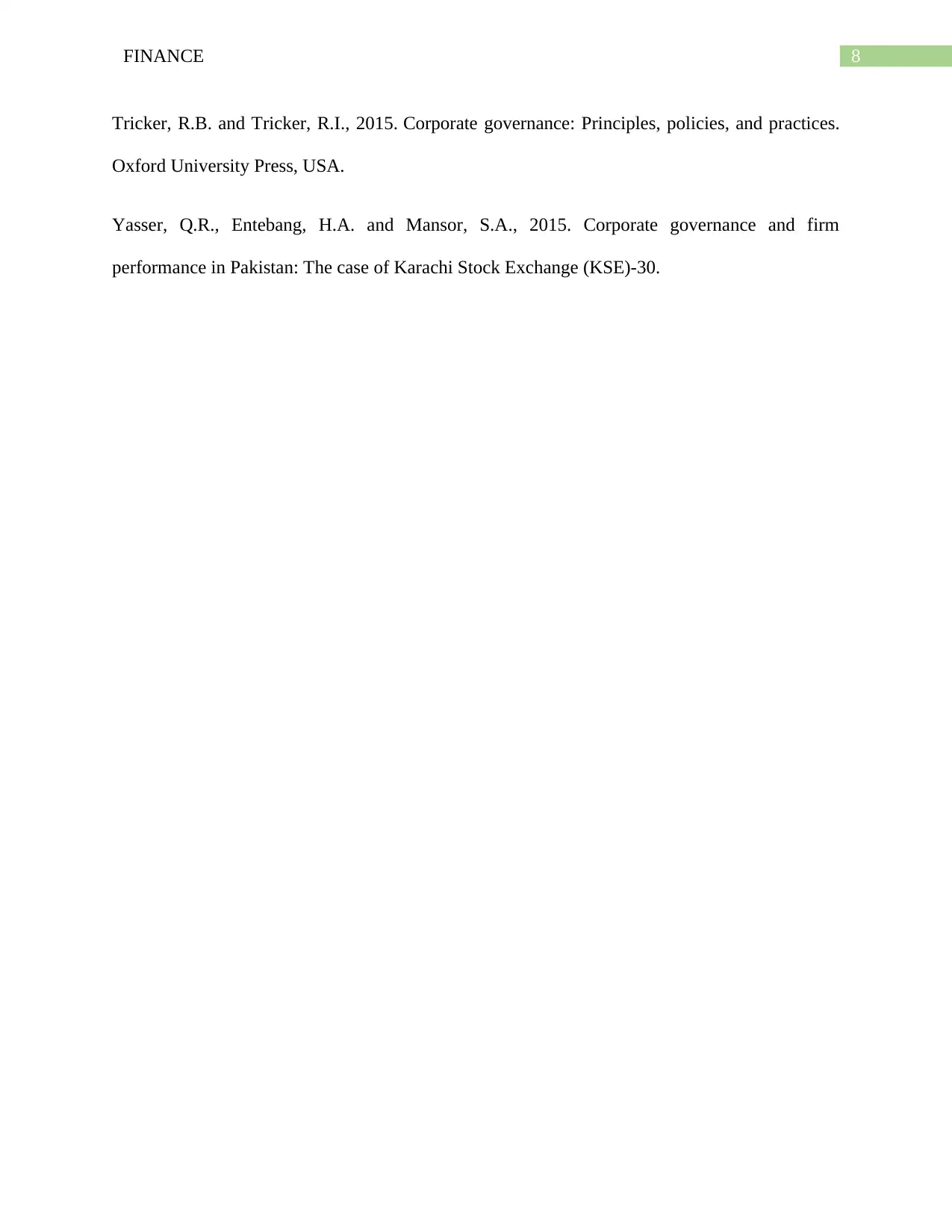
8FINANCE
Tricker, R.B. and Tricker, R.I., 2015. Corporate governance: Principles, policies, and practices.
Oxford University Press, USA.
Yasser, Q.R., Entebang, H.A. and Mansor, S.A., 2015. Corporate governance and firm
performance in Pakistan: The case of Karachi Stock Exchange (KSE)-30.
Tricker, R.B. and Tricker, R.I., 2015. Corporate governance: Principles, policies, and practices.
Oxford University Press, USA.
Yasser, Q.R., Entebang, H.A. and Mansor, S.A., 2015. Corporate governance and firm
performance in Pakistan: The case of Karachi Stock Exchange (KSE)-30.
⊘ This is a preview!⊘
Do you want full access?
Subscribe today to unlock all pages.

Trusted by 1+ million students worldwide
1 out of 9
Related Documents
Your All-in-One AI-Powered Toolkit for Academic Success.
+13062052269
info@desklib.com
Available 24*7 on WhatsApp / Email
![[object Object]](/_next/static/media/star-bottom.7253800d.svg)
Unlock your academic potential
Copyright © 2020–2026 A2Z Services. All Rights Reserved. Developed and managed by ZUCOL.





